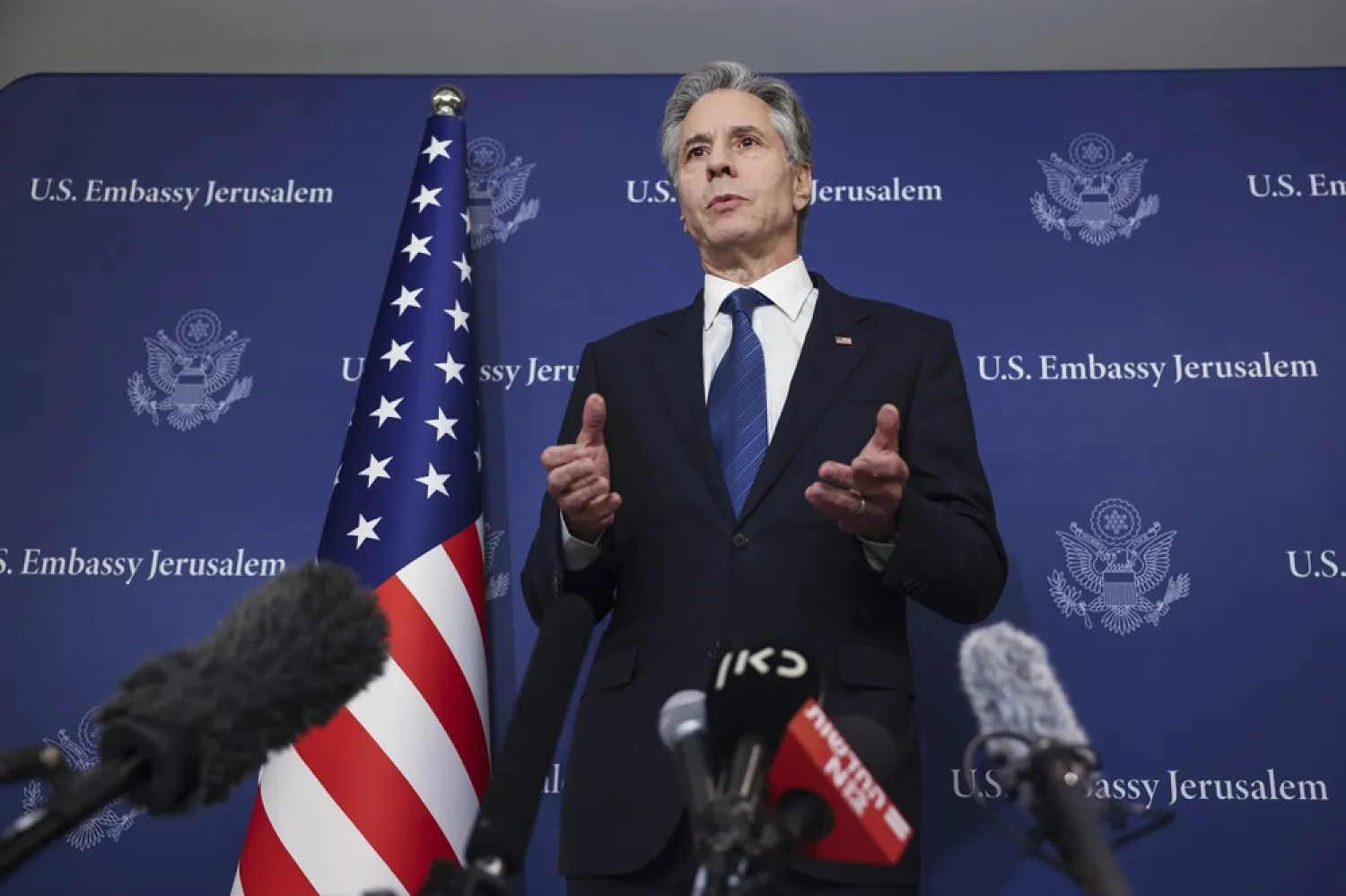US Secretary of State Antony Blinken said Monday that Israel has accepted a proposal to bridge differences holding up a ceasefire and hostage release in Gaza, and he called on Hamas to do the same, without saying whether it had addressed concerns cited by the militant group.
Blinken spoke after holding a two-and-a-half hour meeting with Israeli Prime Minister Benjamin Netanyahu earlier in the day, and was expected to travel to Egypt on Tuesday. The United States, Egypt and Qatar have spent months trying to broker an agreement, with the talks repeatedly stalling.
He did not say whether the so-called bridging proposal addressed Israel's demands for control over two strategic corridors inside Gaza, which Hamas has said is a nonstarter, or other issues that have long bedeviled the negotiations.
"In a very constructive meeting with Prime Minister Netanyahu today, he confirmed to me that Israel supports the bridging proposal," Blinken told reporters. "The next important step is for Hamas to say ‘yes.’"
Blinken had earlier said the time is now to conclude a Gaza ceasefire agreement that would return hostages held by Hamas and bring relief to Palestinian suffering after more than 10 months of devastating fighting in Gaza.
Blinken's ninth mission to the Middle East since the conflict began came days after mediators, including the United States, expressed renewed optimism that a deal was near. But Hamas has expressed deep dissatisfaction with the latest proposal, and Israel has said there were points on which it was unwilling to compromise.
The trip, days before new talks expected this week in Egypt, came amid fears that the conflict could widen into a deeper regional war following the targeted killing of two top militants in Lebanon and Iran that were attributed to Israel.
"This is a decisive moment, probably the best, maybe the last, opportunity to get the hostages home, to get a ceasefire and to put everyone on a better path to enduring peace and security," Blinken said as he opened talks with Israeli President Isaac Herzog in Tel Aviv.
"It’s also time to make sure that no one takes any steps that could derail this process," he said in a veiled reference to Iran. "And so, we’re working to make sure that there is no escalation, that there are no provocations, that there are no actions that in any way move us away from getting this deal over the line, or for that matter, escalating the conflict to other places and to greater intensity."
Herzog thanked Blinken for the Biden administration's support for Israel and lamented a spate of recent attacks against Israelis in the past 24 hours.
"This is the way we are living these days," Herzog said. "We are surrounded by terrorism from all four corners of the earth and we are fighting back as a resilient and strong nation."
Mediators will meet again this week in Cairo to try to cement a ceasefire. Blinken will travel to Egypt on Tuesday for meetings in the Mediterranean city of el-Alamein after he wraps up his Israel stop.
He met one-on-one with Netanyahu on Monday and with Defense Minister Yoav Gallant later in the day.
The war began on Oct. 7 when Hamas-led fighters broke into Israel, killing around 1,200 people, mostly civilians, and abducting around 250 others. Of those, about 110 are still believed to be in Gaza, though Israeli authorities say around a third are dead. More than 100 hostages were released in November during a weeklong ceasefire.
Israel's counterattack in Gaza has killed more than 40,000 Palestinians, according to local health authorities, and devastated much of the territory.
Late last week, the three countries mediating the proposed ceasefire — Egypt, Qatar and the US —reported progress on a deal under which Israel would halt most military operations in Gaza and release a number of Palestinian prisoners in exchange for the release of hostages.
Shortly before Blinken arrived in Tel Aviv on Sunday, Netanyahu told a Cabinet meeting there are areas where Israel can be flexible and unspecified areas where it won’t be.
"We are conducting negotiations and not a scenario in which we just give and give," he said.
The evolving proposal calls for a three-phase process in which Hamas would release all hostages abducted during its Oct. 7 attack. In exchange, Israel would withdraw its forces from Gaza and release Palestinian prisoners.
Hamas accuses Israel of adding new demands that it maintain a military presence along the Gaza-Egypt border to prevent arms smuggling and along a line bisecting the territory so it can search Palestinians returning to their homes in the north. Israel said those weren't new demands, but clarifications of a previous proposal.
Officials said the US has presented proposals to bridge all the gaps remaining between the Israeli and Hamas positions. Formal responses to the US outline are expected this week and could lead to a ceasefire declaration unless the talks stall, as has happened with multiple previous efforts.
Late Sunday, Hamas said in a statement that Netanyahu has continued to set obstacles to a deal by demanding new conditions, accusing him of wanting to prolong the war. It said the mediators’ latest offer was a capitulation to Israel.
"The new proposal responds to Netanyahu’s conditions," Hamas said.
Blinken said Monday both sides should take this opportunity to reach a deal.
"It is time for everyone to get to ‘yes’ and to not look for any excuses to say ‘no,’" he said.
An Israeli delegation held talks with Egyptian officials as part of the truce efforts, an Egyptian official said Monday.
The hourslong meeting Sunday focused on the Philadelphi corridor along the Gaza-Egypt border, but didn’t achieve a breakthrough, according to the official, who spoke on condition of anonymity to discuss the ongoing negotiations.
The official said that Israel still insists on keeping control of the border and the east-west route that bisects Gaza. He said that the delegation didn’t offer anything new in their meeting.









